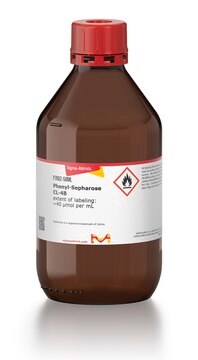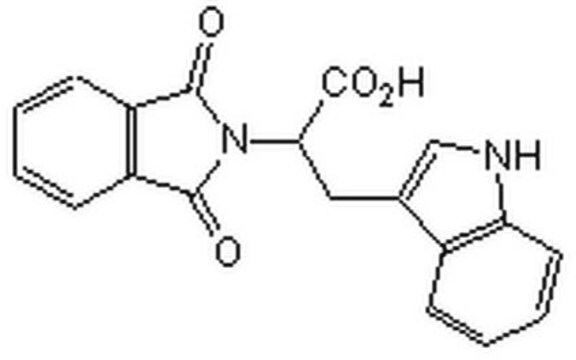R8279
RG108
≥98% (HPLC), powder
Synonym(s):
N-Phthalyl-L-tryptophan
Select a Size
$278.35
List Price$293.00Available to ship onMay 01, 2025Details
Select a Size
About This Item
$278.35
List Price$293.00Available to ship onMay 01, 2025Details
Recommended Products
Quality Level
assay
≥98% (HPLC)
form
powder
optical activity
[α]/D -250 to -310°, c = 0.5 in methanol
color
yellow
solubility
DMSO: >10 mg/mL
storage temp.
−20°C
SMILES string
OC(=O)[C@H](Cc1c[nH]c2ccccc12)N3C(=O)C4=CCCC=C4C3=O
InChI
1S/C19H16N2O4/c22-17-13-6-1-2-7-14(13)18(23)21(17)16(19(24)25)9-11-10-20-15-8-4-3-5-12(11)15/h3-8,10,16,20H,1-2,9H2,(H,24,25)/t16-/m0/s1
InChI key
LMAZUAXDZRILNJ-INIZCTEOSA-N
Related Categories
General description
Application
- in reprogramming and increasing cell plasticity of primary multipotent mesenchymal stromal cells (MMSC)[3]
- as an inhibitor of DNA methyltransferase (DNMTi) in human retinal pigment epithelial ARPE-19 cells[4]
- as a DNA methyltransferase inhibitor in C33A2 cells to test its effect on papillomavirus late gene expression (HPV16)[5]
Biochem/physiol Actions
Features and Benefits
Storage Class
11 - Combustible Solids
wgk_germany
WGK 3
flash_point_f
Not applicable
flash_point_c
Not applicable
Choose from one of the most recent versions:
Certificates of Analysis (COA)
Don't see the Right Version?
If you require a particular version, you can look up a specific certificate by the Lot or Batch number.
Already Own This Product?
Find documentation for the products that you have recently purchased in the Document Library.
Customers Also Viewed
Articles
We offer a variety of small molecule research tools, such as transcription factor modulators, inhibitors of chromatin modifying enzymes, and agonists/antagonists for target identification and validation in gene regulation research; a selection of these research tools is shown below.
Active Filters
Our team of scientists has experience in all areas of research including Life Science, Material Science, Chemical Synthesis, Chromatography, Analytical and many others.
Contact Technical Service












